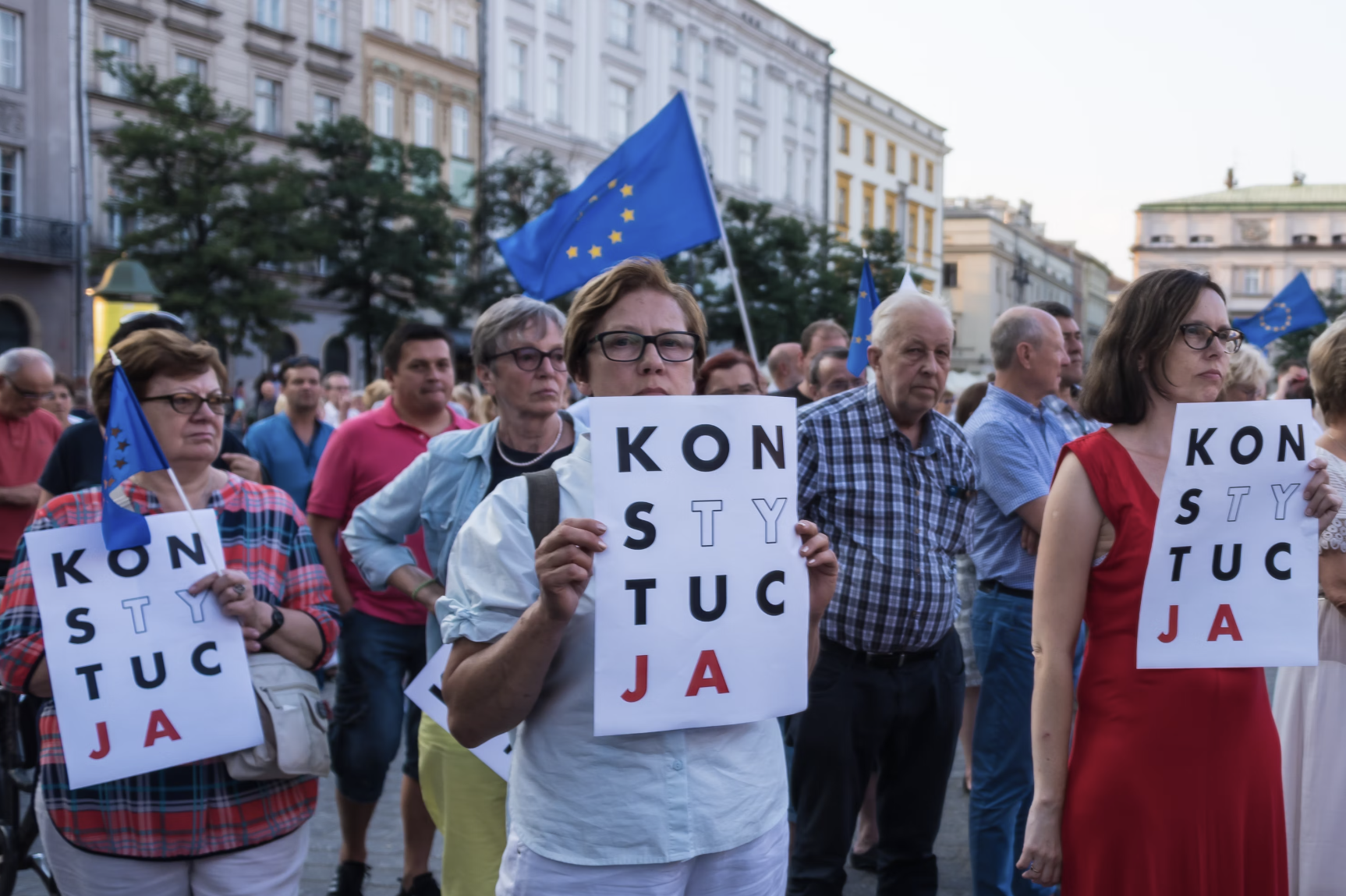
Many of the Polish protesters holding signs that read “KONSTYTUCJA,” which is the Polish word for “Constitution”.
The Polish people are in the process of electing a new president, and these elections are among the most significant in the country’s recent history. The first round of the election took place on the 19th of May, with centrist Rafał Trzaskowski narrowly finishing first with 31.4% of the vote, followed closely by the far-right candidate Karol Nawrocki with 29.5%. Since none of the candidates secured more than 50% of the vote, the election will move to a second round, where the two leading candidates will go head-to-head.
Poland was led from 2015 to 2023 by the nationalist Law and Justice (PiS) party, but PiS was defeated in the 2023 parliamentary elections and lost its majority and the prime ministership after eight years in government. The period of PiS rule marked a political takeover of Poland’s justice system, prompting the European Commission to start a rule of law scrutiny of the country. Article 7 (or the rule of law scrutiny described above) is the European Union’s exceptional mechanism designed to address member states’ breach of the bloc’s core values, which can result in the suspension of certain rights—such as voting rights in the Council of the EU.
The new Polish government, which took office in December 2023 and is led by the Civic Platform party, has introduced a roadmap on restoring the rule of law in Poland. However, this has proven to be challenging due to President Duda, a leading politician of the PiS party, and his constant use of veto power to block judicial reforms. The parliament is unable to overrule the president’s veto power due to the lack of majority. Scholars suggest that should Nawrocki, the candidate supported by the PiS party, win the upcoming presidential elections, the prospects for judicial reforms and thus restoring the rule of law will be diminished—it’s clear that Nawrocki would block these efforts.
During the presidential campaign, accusations emerged against Nawrocki, alleging that he had misrepresented how much property he owns. Additionally, he was accused of exploiting a disabled pensioner, whose apartment Nawrocki acquired in exchange for taking care of him, even though it was later revealed that the pensioner resides in a care home. In response to these allegations, Nawrocki denied any wrongdoings, saying that the attacks were politically motivated and orchestrated by the current government parties. He stated that the ruling parties had taken control not only of the public broadcaster, but also of the Supreme Audit Office, the prosecutor’s office, and even the Polish security services. Furthermore, he described the attacks from the opposing parties as an “unequal fight”, suggesting that in the end, he (and Poland) would prevail. His rhetoric implied that the “opposing forces” were fighting against the will of the people, who would like to see Nawrocki as the president of the country.
By implying that Polish public institutions are working against the will of the people and by portraying them as hostile, Nawrocki questions the integrity of core democratic institutions. He has repeatedly characterized any effort to hold him accountable as politically motivated, and as having no legal basis. This undermines accountability, ultimately weakening the democratic system.
Despite Nawrocki’s allegations that the current government wields strong influence over public institutions, it is, in fact, PiS itself that has eroded judicial independence during its time in power. According to Naumann and Lipska, from 2016 to 2023, the PiS government systematically politicised Poland’s judiciary (Naumann & Lipska, 2025) by packing the courts, including at the regional level. The National Council of the Judiciary, which is responsible for selecting judges and is supposed to safeguard judicial independence, was filled with PiS loyalists (Naumann & Lipska, 2025). As a result, two-thirds of the judges in the Supreme Court were forced to retire. In this context, the judiciary eventually became an extension of the PiS government, severely undermining the independence of the judiciary.
According to Ziblatt and Levitsky (2019), democratic erosion happens when leaders reject the democratic rules of the game. They assert that attempts to reject the constitution or expressing a willingness to violate it indicate authoritarian behaviour (Ziblatt & Levitsky, 2019: 20–25). In this instance, PiS, as the previous ruling party, undermined independent checks and balances. Nawrocki, who is affiliated with the PiS party, has not distanced himself from these actions, instead contending that it is not PiS, but the current government that is to be blamed. Thereby Nawrocki represents a continuation of this pattern of rejection of democratic rules of the game. Nawrocki demonstrates several other warning signs of authoritarian behaviour identified by Ziblatt and Levitsky. For example, his failure to acknowledge PiS’s attacks against the independence of the judiciary amounts to a rejection of the legitimacy of democratic institutions. When Nawrocki deflects criticism by asserting that the existing government, and not PiS, is a danger to democracy, he employs a strategy of discrediting opponents described by Levitsky and Ziblatt: presenting himself as the defender of democracy while actively undermining it.
Poland stands at a critical juncture: the outcome of the presidential election will determine whether the country takes a step toward democratic restoration or back into democratic erosion. A V-Dem indicator measuring judicial constraints on the executive (which measures how much the executive “honours” the constitution and court rulings, as well as how independent the judiciary is) reached its lowest point in recent history in 2021 under the PiS government at 0,54 (V-Dem Institute, n.d.). Since a new government took office last year, the indicator improved to 0,77 by 2024, reflecting recent efforts to restore the rule of law while also highlighting the importance of these presidential elections (V-Dem Institute, n.d.).

0 Comments